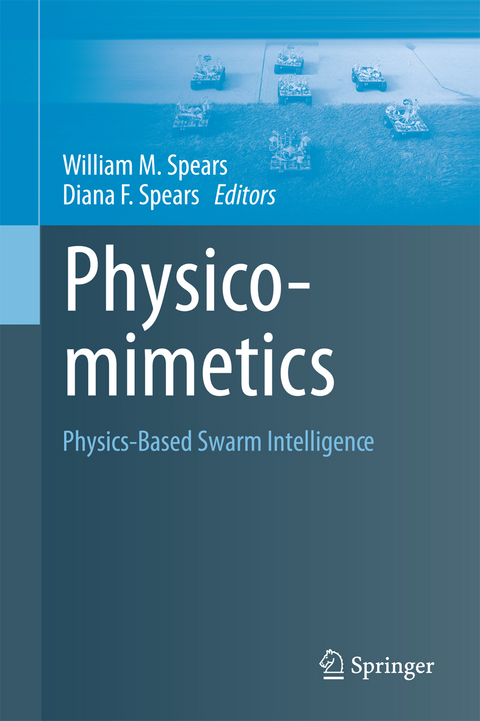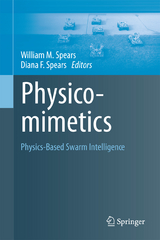Physicomimetics
Springer Berlin (Verlag)
978-3-642-22803-2 (ISBN)
Standard approaches to understanding swarms rely on inspiration from biology and are generally covered by the term "biomimetics". This book focuses on a different, complementary inspiration, namely physics. The editors have introduced the term 'physicomimetics' to refer to physics-based swarm approaches, which offer two advantages. First, they capture the notion that "nature is lazy', meaning that physics-based systems always perform the minimal amount of work necessary, which is an especially important advantage in swarm robotics. Second, physics is the most predictive science, and can reduce complex systems to simple concepts and equations that codify emergent behavior and help us to design and understand swarms.
The editors consolidated over a decade of work on swarm intelligence and swarm robotics, organizing the book into 19 chapters as follows. Part I introduces the concept of swarms and offers the reader a physics tutorial; Part II deals with applications of physicomimetics, in order of increased complexity; Part III examines the hardware requirements of the presented algorithms and demonstrates real robot implementations; Part IV demonstrates how the theory can be used to design swarms from first principles and provides a novel algorithm that handles changing environments; finally, Part V shows that physicomimetics can be used for function optimization, moving the reader from issues of swarm robotics to swarm intelligence. The text is supported with a downloadable package containing simulation code and videos of working robots.
This book is suitable for talented high school and undergraduate students, as well as researchers and graduate students in the areas of artificial intelligence and robotics.
Dr. William Spears is the CEO of Swarmotics LLC, a company that provides consulting expertise in distributed agents, sensing networks, artificial intelligence, machine learning, optimization, and swarm robotics; he was formerly a professor in the Dept. of Computer Science at the University of Wyoming, Laramie. Dr. Diana Spears was a professor in the Dept. of Computer Science at the University of Wyoming, Laramie, and is currently a director of Swarmotics, LLC.
Part I - Introduction
Chap. 1 - Nature Is Lazy
Chap. 2 - NetLogo and Physics
Chap. 3 - NetLogo and Physicomimetics
Chap. 4 - Pushing the Envelope
Part II - Robotic Swarm Applications
Chap. 5 - Local Oriented Potential Fields: Self-deployment and Coordination of an Assembling Swarm of Robots
Chap. 6 - Physicomimetics for Distributed Control of Mobile Aquatic Sensor Networks in Bioluminescent Environments
Chap. 7 - Gas-Mimetic Swarms for Surveillance and Obstacle Avoidance
Chap. 8 - A Multirobot Chemical Source Localization Strategy Based on Fluid Physics: Theoretical Principles
Chap. 9 - A Multirrobot Chemical Source Localization Strategy Based on Fluid Physics: Experimental Results
Part III - Physicomimetics on Hardware Robots
Chap. 10 - What Is a Maxelbot?
Chap. 11 - Uniform Coverage
Chap. 12 - Chain Formations
Chap. 13 - Physicomimetic Motion Control of Physically Constrained Agents
Part IV - Prediction, Adaptation, and Swarm Engineering
Chap. 14 - Adaptive Learning by Robot Swarms in Unfamiliar Environments
Chap. 15 - A Statistical Framework for Estimating the Success Rate of Liquid-Mimetic Swarms
Chap. 16 - Physicomimetic Swarm Design Considerations: Modularity, Scalability, Heterogeneity, and the Prediction Versus Control Dilemma
Chap. 17 - Using Swarm Engineering to Design Physicomimetic Swarms
Part V - Function Optimization
Chap. 18 - Artificial Physics Optimization Algorithm for Global Optimization
Chap. 19 - Artificial Physics for Noisy Nonstationary Environments
App. A - Anomalous Behavior of the Random Number Generator
Index
References
| Erscheint lt. Verlag | 5.1.2012 |
|---|---|
| Zusatzinfo | XXX, 646 p. With online files/update. |
| Verlagsort | Berlin |
| Sprache | englisch |
| Maße | 155 x 235 mm |
| Gewicht | 1111 g |
| Themenwelt | Informatik ► Theorie / Studium ► Künstliche Intelligenz / Robotik |
| Naturwissenschaften ► Physik / Astronomie ► Angewandte Physik | |
| Technik ► Elektrotechnik / Energietechnik | |
| Schlagworte | Adaptive Learning • Adaptive Systems • Agents • Artificial physics • Biometrie • Biomimetics • Fluid physics • Künstliche Intelligenz • Mimetics • Optimization • Physicomimetics • robots • Schwarmintelligenz • swarm engineering • swarm robotics |
| ISBN-10 | 3-642-22803-8 / 3642228038 |
| ISBN-13 | 978-3-642-22803-2 / 9783642228032 |
| Zustand | Neuware |
| Haben Sie eine Frage zum Produkt? |
aus dem Bereich




